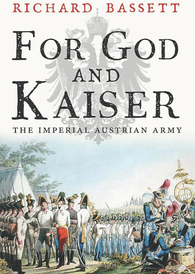
well understood among people
in Canada. Partly this is an issue of
being overshadowed. The Great War
narrative doesn't delve into Austria's
military role to any great extent. We
never fought directly against Austria
(although all four of the so-called
French-Indian Wars involved Austria
to some degree). And to a certain
extent the Austrian Empire does not
fit neatly into the modern
understanding of the nation-state.
to come away with a few mistaken ideas; Austria lost a lot of
battles and wars, the Empire was unstable, and its ruling
class was completely out of touch with reality.
Richard Bassett attempts to provide an alternative narrative
in 'For God and Kaiser: The Imperial Austrian Army'. The main aim is to show that the Austrian Army was on par with
other countries and its primary aim was protecting the
Habsburg dynasty which led to a sort of institutionalized
caution.
For starters let me say that I rather enjoyed Mr. Bassett's
writing style. It is a great sin for history writers to make war boring. This is a sin Mr. Bassett is not guilty of. Partly this is
due to the brisk pace he had to keep to cover so much history.
Partly I feel it is due to treating the army itself as a character
with its own personality and aims. This is reinforced by a
primary theme throughout the book that the army and
dynasty had a mutually dependent relationship and that the
army should do nothing that would endanger the dynasty's
survival.
 Flag of the Austrian Empire
Flag of the Austrian Empire showing how key battles progressed. It
does somewhat lack in territorial maps
and the ones it has could be more useful
if placed in the sections describing the
battles. But overall, these are minor
concerns.
least one reviewer has pointed out that the book has some
editing errors. And while these errors don't detract from the
main points that are trying to be conveyed they do require the
book be treated carefully. A second, minor, concern is that
Mr. Bassett is a fan of the Austrian Empire. While this leads to
a great deal of passion that makes for an enjoyable read it can
lead to (unintentionally) glossing over some faults. This book
would benefit greatly from a second edition to address these
issues. But overall, as an introduction to the study of Austria
this book works well.
Loyally Yours,
A Kisaragi Colour
 RSS Feed
RSS Feed





